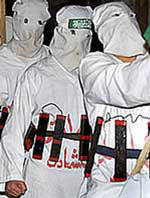
Below is part of an essay (linked in full above) written by Ralph Peters for the Weekly Standard, about "The Counterrevolutions in Military Affairs." I found the below observations of the Suicide Bomber to be insightful and disturbing. Well worth the read:
Not a single item in our trillion-dollar arsenal can compare with the genius of the suicide bomber--the breakthrough weapon of our time. Our intelligence systems cannot locate him, our arsenal cannot deter him, and, all too often, our soldiers cannot stop him before it is too late. A man of invincible conviction--call it delusion, if you will--armed with explosives stolen or purchased for a handful of soiled bills can have a strategic impact that staggers governments. Abetted by the global media, the suicide bomber is the wonder weapon of the age.![]()
The suicide bomber's willingness to discard civilization's cherished rules for warfare gives him enormous strength. In the Cain-and-Abel conflicts of the 21st century, ruthlessness trumps technology. We refuse to comprehend the suicide bomber's soul--even though today's wars are contests of souls, and belief is our enemy's ultimate order of battle. We write off the suicide bomber as a criminal, a wanton butcher, a terrorist. Yet, within his spiritual universe, he's more heroic than the American soldier who throws himself atop a grenade to spare his comrades: He isn't merely protecting other men, but defending his god. The suicide bomber can justify any level of carnage because he's doing his god's will. We agonize over a prisoner's slapped face, while our enemies are lauded as heroes for killing innocent masses (even of fellow believers). We continue to narrow our view of warfare's acceptable parameters even as our enemies amplify the concept of total war.
Islamist terrorists, to cite the immediate example, would do anything
to win. Our enemies act on ecstatic revelations from their god. We act on the advice of lawyers. It is astonishing that we have managed to hold the line as well as we have.
The ultimate precision weapon, the suicide bomber simultaneously redefines the scope of "legitimate" targets. Delighted to kill our troops, this implacable enemy who regards death as a promotion is equally ready to slaughter men, women, and children of unknown identity who have done him no harm. His force of will towers over our own. He cannot win wars on the traditional battlefields we cherish, but his commitment and actions transcend such tidy limits. In the moment of his deed, the suicide bomber is truly larger than life. The world's a stage, and every suicide bomber is, at least briefly, a star.
We will develop the means to defeat the majority of, if not all, improvised explosive devices. But the suicide bomber--the living, thinking assassin determined to die--may prove impossible to stop. Even if we discover a means to identify him at a distance from our troops, he has only to turn to easier targets. Virtually anything the suicide bomber attacks brings value to his cause--destruction of any variety is a victory. The paradox is that his act of self-destruction is also an undeniable assertion that "I am," as he becomes the voice from below that the mighty cannot ignore. We are trained to think in terms of cause and effect--but the suicide bomber merges the two. The gesture and the result are inseparable from and integral to his message. Self-destruction and murder join to become the ultimate act of self-assertion.
And his deed is heralded, while even our most virtuous acts are condemned around the world. Even in the days before mass media, assassins terrorized civilizations. Today, their deeds are amplified by a toxic, breathtakingly irresponsible communications culture that spans the globe. Photogenic violence is no longer a local affair--if a terrorist gives the media picturesque devastation, he reaches the entire planet. We cannot measure the psychological magnification, although we grasp it vaguely. And the media's liturgical repetition of the suicide bomber's act creates an atmosphere of sacrament. On a primal level, the suicide bomber impresses even his enemies with his conviction. We hasten to dismiss his deed as a perversion, yet it resounds as a vivid act of faith. Within his own cultural context, people may hate what the suicide bomber does, yet revere his sacrifice (and, too often, they do not hate what he does).
We may refuse to accept it, but suicide bombing operates powerfully on practical, emotional, and spiritual levels--and it generates dirt-cheap propaganda. To the Muslim world, the suicide bomber's act is a proof of faith that ensnares the mind with a suspicion of his righteousness. He is a nearly irresistible champion of the powerless, the Middle East's longed-for superhero, the next best thing to the Mahdi or the Twelfth Imam.
We praise Nathan Hale's willingness to die for his cause. Now imagine thousands of men anxious to die for theirs. The suicide bomber may be savage, brutal, callous, heartless, naive, psychotic, and, to us, despicable, but within his milieu he is also heroic.
The hallmark of our age is the failure of belief systems and a subsequent flight back to primitive fundamentalism--and the phenomenon isn't limited to the Middle East. Faith revived is running roughshod over science and civilization. Secular societies appear increasingly fragmented, if not fragile. The angry gods are back. And they will not be defeated with cruise missiles or computer codes.
Hell to pay
-
If he were so inclined, I think Governor Walz could rewrite the Paul Simon
song subtitled “How I Was Robert McNamara’d into Submission.” In Walz’s
case, it...
1 hour ago



































No comments:
Post a Comment
Please keep it clean. Comments do not reflect the opinion of this blog and are the sole opinion of the commenter. We reserve the right to delete any comment for any reason. Of course, opposing views are welcomed.
Auto-flagged and monitored IP addresses:
Teksavvy - IP 76.10.141, Onterio, Canada.
Charter Communications - IP 68.188.68. Ballwin, Missouri